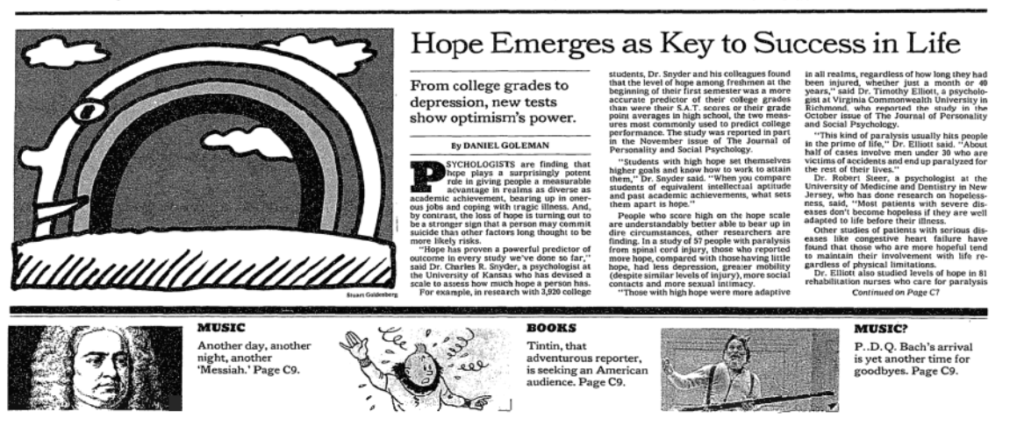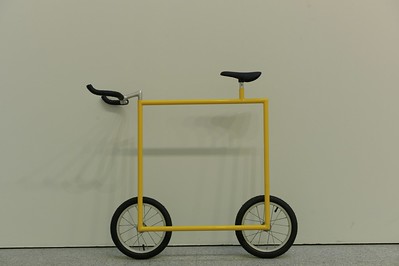

Hope & Reinvention
In Reinvention, the Partner of Inevitable (At Least Occasional) Failure MUST Be Hope, but the Kind of Hope That IS a Strategy!
The most recent episodes in this saga of reinvention focused on the importance of the employment of failure. That bracing advice requires a sort of mixer; if failure is the whiskey in this reinvention cocktail than hope is the cream, the element that smooths and sweetens. (A previous blog post covered this topic from the perspective of tests that might help us to learn how to acquire and refine noncognitive constructs; things like conscientiousness, resilience, assertiveness, collaboration, and hope.)
Follow the rest of this story in this post here
Failure and Reinvention
Still thinking about a possible reinvention of your working life? Maybe even your entire life? Of course, you are or you wouldn’t be applying your attention here. With that motivation, you’re in very good company.
If you talk of fifty years of working life… you have to reinvent yourself. You have to make something different out of yourself…”
Peter Drucker
Drucker was right about this as he was about so many things. And if you need a refresher as to what we are proposing, you can find the first posts in this series here:
Investigating the ‘WHY’ of your reinvention
One more look at the why of your reinvention is necessary as it relates to providing fuel and support for times when you will fail in that project.

Yes, reinvention requires failure & learning. Consider these words of Garrison Leykam
“And, without failure, there can be no success. The learning that comes with falling short of a goal actually propels us forward. Unfortunately, it is drilled into our heads in school that failing is something we want to avoid at all costs — that failing is a bad thing because we didn’t study hard enough or, worse, that somewhere we are just not smart enough to succeed. To reinvent our career, we must not only redefine how we will define success in our new life but also how we will rethink and relate to failure. To learn, we must embrace failure.”
Of course, Garrison is drawing upon the wisdom of many others when it comes to recognizing the importance of risking, experiencing, and investigating the failures that are likely if not inevitable when we seek to reinvent ourselves, when we leave the field in which we know what to do and enter a field of features new and strange.
The leading light of 20th century behaviorism, BF Skinner, receives much less attention in contemporary conversations, and many of his conclusions did not prove to be valid. Some of his observations, however, are well worth considering especially around the subject of failure:
A failure is not always a mistake, it may simply be the best one can do under the circumstances. The real mistake is to stop trying.
BF Skinner
When urging those considering the journey of reinvention to start with specifying why they want to undertake that work, I wrote here that ‘Why’ matters because “during the real work of reinvention we need to return to that ‘raison d’changer’. It is our justification. Examining this at the outset influences many other decisions and actions starting with the question of whether the ‘why’ is worth the work, the view is worth the climb. There are no true easy reinventions. They are all arduous.”
Arduous implies multiple meanings: the goal is lofty but the pursuit is hard. Part of what makes it difficult is that learning how to fail in a useful way is not included in many official or unofficial curricula. Chris Argyris, the organizational theorist who influenced many of us looking at executive life, once wrote that: “Because many professionals are almost always successful at what they do, they rarely experience failure. And because they have rarely failed, they have never learned how to learn from failure.”
Subscribing to the French saying that Rihanna has tattooed on her arm —
Jamais un échec, toujours une leçon (Never a failure, always a lesson) — is easier than figuring out how to crack the lesson. And nailing the ‘why’ of your reinvention will aid obtaining and sustaining the fortitude needed as you experiment with new skills and possibilities. If we haven’t answered the question, for what reason am I taking on extra work along with the anxiety of uprooting myself from a way of being with which I am at least familiar if not comfortable then the first time the pain of insufficiency strikes us we might abandon the effort. And for many of us, that would be a mistake because we wouldn’t have explored the idea of reinvention unless deep down we sensed that there was a proper cause or motive for doing so. Something in our gut told us it was time to move on, to venture elsewhere. But we need to articulate that something in order to advantage ourselves with the knowledge when the trying to be different gets very trying.
One must try to fail because it is the only strategy to avoid repeating the obvious, beyond what you know and beyond what you know how to do. Failing better happens when we ask questions, when we doubt results, when we allow ourselves to be immersed in uncertainty.
Stuart Firestein
Our previous post detailing the necessity of exploring why reinvention is the path for you to take right now offered some examples of answers to that question: acquire additional “resources (e.g., more money), [alter] self-image (e.g., more status and/or satisfaction), and [fulfill] destiny (e.g., who I’m really supposed to be). Answers heard less frequently but nonetheless relevant are [effect] escape (e.g., tired of being me), [combat] despair (e.g., the ship is sinking), and [relieve] boredom.”
Now that we have introduced the notion of likely and even essential failure as part of reinvention, how do you think your answer to the question ‘why’ will hold up under those circumstances? For example, is your desire to relieve boredom in your current job weighty enough to push you through the fatigue of little experiments in how you live that will probably not always go well? If the answer to that question is dubious as to how profound that desire stands, then maybe this isn’t the time for reinvention. Or perhaps when you go back and ask yourself ‘why’ again, you will discover that there are more substantial purposes to propel you “to adopt a new image or identity for oneself; to change [your] behaviour in order to respond to a change in environment or react to opportunity.”
Similarly, an answer to the ‘why question’ was only “more money, more money, more money” may prove insufficiently aspirational for the labors of reinvention. Agnes Callard is instructive here from her book on aspiration:
“So, somebody who, quote-unquote, “aspires” to make a lot of money already knows why they want money. They’re not trying to learn why they want money. They’re not trying to learn why money is good.” An initiative that fails to be aspirational may not suit the type of reinvention illustrated in this series. Our exploration of the ‘why’ of your reinvention must take up seriously why you want money or change or differed status or more leisure time or added feeling of worthwhileness or anything else. Aspiration and reinvention may differ from ambition; the latter is fine but you can satisfy it by reaching the stated goal; reinvention implies “trying to find something more specific than yourself,” moving toward a new conception of what you value and how to achieve that state. (For a different and very useful take by renowned executive coach Marshall Goldsmith go to this link.)
That sense of the value that you expect to attain from your reinvention, the answer to the ‘why question’ will serve as the foundation from learning from whatever failures you experience usefully. That value was your goal and whatever little experiment you ran did not seem to move you closer to the goal. That allows you to reflect on why you thought it would and why you were wrong. And then you construct another little experiment and get some more learning from that as you head toward being in a different place in your career.
The practice of reinvention as we will describe it in the series includes adopting this practice of small experimentation, rigorous reflection, and assiduous knowledge creation. That’s different than the state that the Oxford English Dictionary described in its word of the year for 2022: goblin mode: “recognising our desire, particularly as we emerged from the pandemic, to engage in ‘unapologetically self-indulgent, lazy, slovenly, or greedy’ behaviour that typically ‘rejects social norms or expectations’.”
The work of reinvention stands opposite to that behavior. In order to explore new occupations and acquire new skills, we have to scoop out time in schedules that are already packed with obligations and requirements. We have to avoid beating ourselves up when we fall down rabbit holes and collide with dead ends. And as we have argued in this post, we have to try things at which we may not succeed.
In doing so, it gets better. Failure becomes acceptable and reveals constraints to our reinvention. I’ll go further and say that failure becomes desirable because it is only through eliminating one possibility that we will understand what we should do next, how to revise the current theory and craft the next one.
And how do we get to an understanding of our theory of reinvention? Well, that’s the next post and you can find it here. But let’s end with a quote from a writer whose life illustrates reinvention in many ways — George Eliot (Marian Evans Lewes)
“I’m proof against that word failure. I’ve seen behind it. The only failure a man ought to fear is failure of cleaving to the purpose he sees to be best.
George Eliot